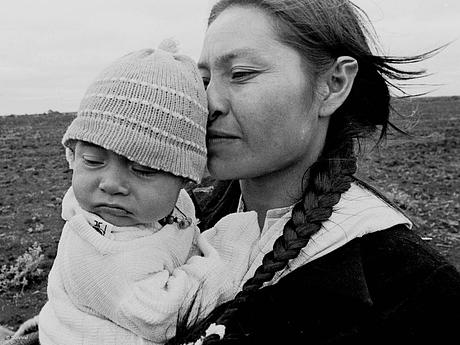Guarani: respected shaman dies
August 31, 2002
This page was last updated in 2002 and may contain language which is now outdated.
Paulito Aquino, a Kaiowá shaman and one of Brazil's oldest citizens, died on 3 September 2002 in his village of Panambizinho in Mato Grosso do Sul state, Brazil. Reckoned to be aged about 120, he had witnessed massive changes in his long life. His Kaiowá name, Avá Araruá, means 'a small Indian with great knowledge'.
Paulito's tribe, the Kaiowá, are part of the great Guarani nation which was one of the first peoples to encounter and confront the European colonisers in the 16 century. The Kaiowá, or 'forest people', managed to hide from the whites for centuries: as a young boy, Paulito never saw any white people, but as Brazil's final frontiers opened up during the last century, the Kaiowá's forest was destroyed to make way for vast sugar cane and soya plantations and cattle ranches. Religious sects moved into the area and tried, often in vain, to eradicate the Guarani's own beliefs.
Paulito's own community of Panambizinho suffered as all the Kaiowá communities did, with their land surrounded and taken over by colonists in the 1940s and gunmen sent to prevent them from returning to their former lands – squeezed onto just 60 hectares, they experienced pollution, hunger and suicides of despairing teenagers. In 1999 alone, Panambizinho saw at least two acts of collective teenage suicide.
Paulito appealed to organisations like Survival International for help. In 1994, Aristides Junqueira, the attorney general, visited Mato Grosso do Sul and declared that 'a cow has more rights than an Indian' in the state. The then justice minister, Nelson Jobim, not noted for his pro-Indian views, stated that former lands would be restored to the community and 'demarcated' in accordance with Brazil's constitution. But sadly Paulito never lived to see this day. Tired of waiting for justice and for promises to the fulfilled, the Indians of Panambizinho carried out a retomada, a retaking of part of their ancestral land, in 2001. But, as is typically the case, they were threatened and rebuffed, forced back behind the electric fences having reoccupied only five hectares of the 1,300 due to them.
Paulito was born in Panambizinho and lived all his life there. As a child he learned how to pray and later became a rezador, or shaman; his knowledge became legendary. Eminent anthropologists like Darcy Ribeiro, Bartomeu Meliá and Egon Schaden recognised his gifts both as an orator and a fighter for his people's rights. For the Guarani, 'the shaman learns to pray; there are different prayers to guard against snake bite, illnesses and attack by jaguars, for sun and for rain. The shaman lives like a spirit and has all in his head, a telephone line to god.' Paulito was the guardian of 147 prayers and with his wife, Balbina Francisca, led prayers in the oca or huge communal prayer house, which was for many years the only one left in any Guarani community in Brazil. Paulito was one of the few who knew how to perform the tembe'ta or lip piercing ceremony performed on boys marking their transition from childhood to adulthood, where a slim stick of hardened tree resin is pierced into the lower lip. As a shaman he was responsible for the well being of the community and along with recognition of their land rights, Paulito believed that the Guarani's religion and way of life were crucial to their survival and happiness. He taught his grandchildren to sing and dance: 'When I teach my grandchildren or anyone I feel very, very happy. I think it's great, fantastic. My soul is full of joy. Anyone can learn to be a shaman if they want to.' He taught his people ceremonies that were being forgotten: the corn festival celebrating the harvest, for instance, was recently performed in his village for the first time in years.
Paulito summed up his people's situation in an interview with Survival in 1998. 'Our religion and way of life are under attack. We do not have enough land to continue our old ways in the correct way. In the past this was a very big Indian area. I got married when I was a young man, and I had 25 hectares of land for my garden, and this land fed my family and parents. We didn't know about sugar and salt then. For sugar we used the honey we collected from bees. We had our chicha [fermented corn drink] and we had lots of fish. I would perform a fish prayer and I would see the fish fatten over time. Then I would put a line in the water and take two or three, just what I needed. There were always plenty of fish in those days. There were no white people then.'
And then the white people started to come in. We saw them cut down the forest and make gardens for themselves. In those days my people lived in four large communal houses. I always remember one old man said, "The whites – they're going to finish us off. They're going to finish off our houses, finish our fish, even our crops. And once all our forest is gone, we as a people will be finished. It's all going to change and our land will become very small." And you know, that man, all those years ago, calculated absolutely right.'
After years of harassment, poverty and denial of their most fundamental rights, the Kaiowá, thanks in great part to Paulito's guidance, are confronting Brazil's lumbering legal system and indifferent authorities and look set to eventually regain their tekoha, their ancestral land.
In accordance with Kaiowá beliefs Paulito died where he was born and his soul will return to the creator, or 'Great Father', Ñande Ru. Paulito's legacy lives on in his vast family. He leaves behind his wife Balbina Francisca, 102, to whom he was married for nearly 90 years, 12 children and many grandchildren and great-grandchildren.
Find out more about the Guarani suicide epidemic by viewing Related Material in the right-hand menu.



